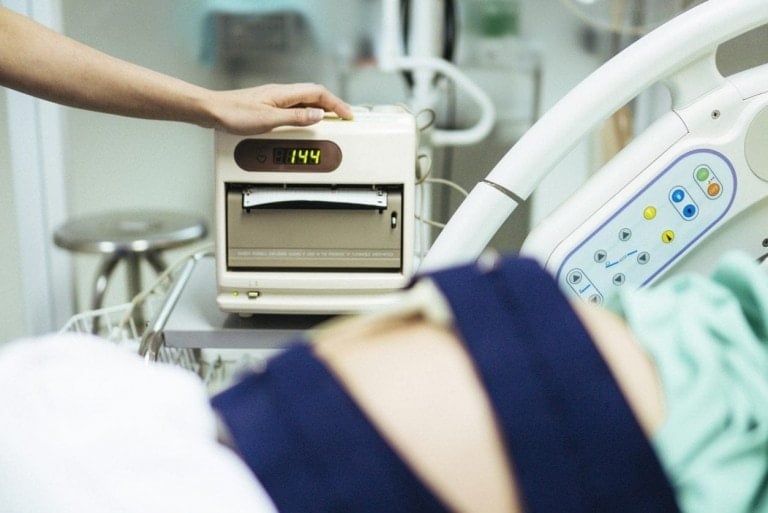Nausea and vomiting during pregnancy can feel like a rite of passage. From bouts of queasiness to all-out hugging the toilet, morning sickness comes in all types, just like pregnancies. But what does it mean when morning sickness becomes so severe that no amount of food or water seems to stay down? Or when you lose weight instead of gaining, and when your health creates health risks for your growing baby? Hyperemesis gravidarum, a severe condition that impacts some pregnant people, may feel like a never-ending hurdle race to delivery.
What Is Hyperemesis Gravidarum?
Morning sickness or nausea and vomiting of pregnancy (NVP) plagues up to 80% of pregnant parents. Approximately 2% of pregnant people will suffer from severe NVP or hyperemesis gravidarum (HG).1,3
Hyperemesis gravidarum’s nausea and vomiting are severe enough to significantly threaten the health of the pregnant parent and a developing baby. There are no formal diagnostic criteria for HG. It is the most common reason for hospitalization in early pregnancy and can be incredibly challenging to treat.1,5
What Causes Hyperemesis Gravidarum?
The cause of NVP and HG is poorly understood, but many studies have suggested plausible theories with supporting evidence.1
One reason for these unpleasant symptoms involves hormonal changes in pregnancy. Following implantation – when a fertilized egg attaches to the uterine lining – there is a major hormonal shift of estrogen, progesterone, and human chorionic gonadotropin (hCG). The hormone hCG promotes the growth of the uterine lining for the developing embryo and signals the body to halt menstruation.1,6
Studies suggest this hormone shift, especially the production of hCG, could be responsible for nausea and vomiting. While every pregnancy must include the production of hCG, evidence has linked higher levels of hCG to greater severity of NVP symptoms. Conditions when this occurs includes:1
- Multiple gestation pregnancy, such as twins or triplets
- Genetically female fetuses
- Down syndrome or other abnormal chromosome conditions
- Molar pregnancy, a rare complication of pregnancy characterized by abnormal growth of cells intended to become the placenta that instead forms a tumor
Some studies also suggest a genetic predisposition; the placenta, Helicobacter pylori bacteria in the stomach, serotonin, and thyroid hormones may promote NVP and HG symptoms.1
Hyperemesis Gravidarum Symptoms
Hyperemesis gravidarum symptoms are extreme, unrelenting, and can significantly impact everyday activities. Symptoms include the following:1
- Severe nausea and vomiting
- Excess salivation
- Heartburn or reflux
- Signs of dehydration such as dry mucous membranes, fast heart rate, and dizziness upon standing
- Muscle weakness
- Change in mental status
- The symptoms of HG are severe enough to cause dangerous changes in your body chemistry that can have severe consequences1
- Weight loss of more than 5% of pre-pregnancy weight
- Ketosis; when your body burns fat for energy instead of sugar
- Electrolyte imbalances
- Vitamin deficiencies
- Acute kidney injury (AKI)
- Cardiac arrhythmias
The adverse effects of HG can decrease your quality of life and have the potential for physical and emotional impacts beyond delivery. Consequences of severe NVP or HG include:3
- Negatively impacted personal relationships, especially with your partner
- Stressed professional relationships due to missed work
- Tearfulness and irritability
- Depression
- Post-traumatic stress disorder
- Sleep disturbances
- Longer postpartum recovery times
Hyperemesis Gravidarum Treatment
If you suffer from HG, you likely have already tried all the tips and tricks to combat morning sickness naturally. HG generally requires more aggressive treatment like pharmacologic or medication options.7
HG treatment aims to decrease symptoms and minimize the risk to the pregnant parent and the developing baby. Treatment depends on the severity of symptoms. Medication regimens may be a course of trial and error because of the lack of evidence for specific HG treatments.7
Medication Options
Medications during pregnancy are a concern when treating HG. Any medication listed here is a Pregnancy Category C and below:2
- Antihistamines decrease stimulation to the vomiting center of the brain. Examples include diphenhydramine (Benadryl), dimenhydrinate (Dramamine), and meclizine (Antivert).
- Diclegis is a prescription medication that is a combination of doxylamine succinate and pyridoxine hydrochloride.
- Antiemetics are antinausea and vomiting medications such as chlorpromazine (Thorazine), prochlorperazine maleate (Compazine), and promethazine (Phenergan).
- Benzamides include metoclopramide (Reglan), a dopamine and serotonin receptor antagonist that decreases nausea and vomiting.
- Serotonin receptor antagonist, which includes ondansetron (Zofran).
- Acid-reducing agents such as ranitidine (Zantac) or famotidine (Pepcid) aim to reduce heartburn and acid reflux.
- Corticosteroids appear to have an antiemetic effect.8
Hospitalization
Treatments within the hospital may include:2
- Intravenous fluids are administered through an intravenous line for severe dehydration or ketonuria and to correct electrolyte imbalances.
- Enteral tube feeding and total parenteral nutrition may be required if initial intravenous therapy is ineffective and a calorie deficit remains.
How Long Does Hyperemesis Gravidarum Last?
Hyperemesis gravidarum symptoms can begin at four weeks gestation and last until 16 or 18 weeks of pregnancy. But symptoms can also last longer and even extend until delivery.2
Will Hyperemesis Gravidarum Harm My Baby?
While NVP is associated with a decreased risk of adverse outcomes for a baby, studies have demonstrated that those suffering from HG are at an increased risk of:1,4,5
- Intrauterine Growth Restriction (IUGR) or poor baby growth in the uterus
- Low birth weight, likely due to maternal malnutrition
- Premature birth
- Low Apgar score
Working with your healthcare providers to find a treatment that minimizes symptoms while protecting your health and your baby’s is essential. Your healthcare team will be vigilant in monitoring symptoms, providing nutritional support, managing symptoms, and encouraging psychological well-being.
Knowing your morning sickness will pass does not bring much comfort when you suffer from nausea and vomiting during pregnancy, let alone hyperemesis gravidarum. Creating life within your body is an amazing journey, but not without tribulations. Finding the right healthcare team and creating a treatment plan that provides relief is possible and imperative.
































